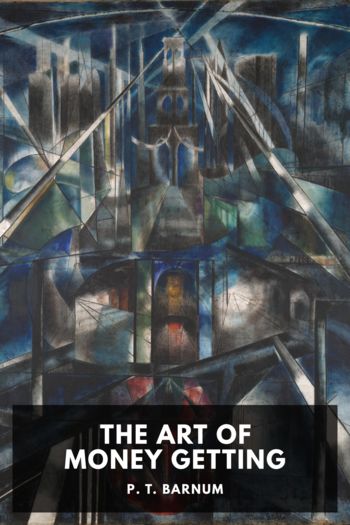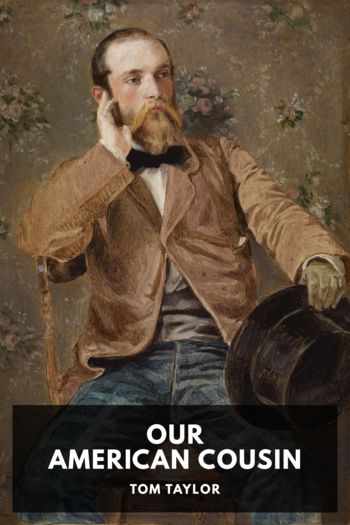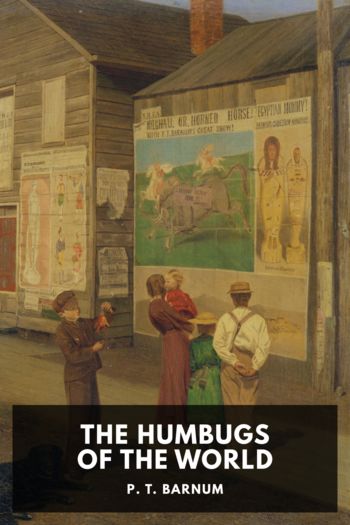Struggles and Triumphs by P. T. Barnum (love novels in english TXT) 📕

- Author: P. T. Barnum
Book online «Struggles and Triumphs by P. T. Barnum (love novels in english TXT) 📕». Author P. T. Barnum
“Mr. Barnum, I have sent for you to say that Mr. Bennett has concluded not to purchase the museum lots, and therefore that you had better take back the lease, and return the $200,000 paid for it.”
“Are you in earnest?” I asked with surprise.
“Certainly, quite so,” he answered.
“Really,” I said, smiling, “I am sorry I can’t accommodate Mr. Bennett; I have not got the little sum about me; in fact, I have spent the money.”
“It will be better for you to take back the lease,” said the attorney seriously.
“Nonsense,” I replied, “I shall do nothing of the sort, I don’t make child’s bargains. The lease was cheap enough, but I have other business to attend to, and shall have nothing to do with it.”
The attorney said very little in reply; but I could see, by the almost benignant sorrow expressed upon his countenance, that he evidently pitied me for the temerity that would doubtless lead me into the jaws of the insatiable monster of the Herald. The next morning I observed that the advertisement of my entertainments with my Museum Company at Winter Garden was left out of the Herald columns. I went directly to the editorial rooms of the Herald; and learning that Bennett was not in, I said to Mr. Hudson, then managing editor:
“My advertisement is left out of the Herald; is there a screw loose?”
“I believe there is,” was the reply.
“What is the matter?” I asked.
“You must ask the Emperor,” said Mr. Hudson, meaning of course Bennett.
“When will the ‘Emperor’ be in?” I inquired; “next Monday,” was the answer.
“Well, I shall not see him,” I replied; “but I wish to have this thing settled at once. Mr. Hudson, I now tender you the money for the insertion of my Museum advertisement on the same terms as are paid by other places of amusement, will you publish it?”
“I will not,” Mr. Hudson peremptorily replied.
“That is all,” I said. Mr. Hudson then smilingly and blandly remarked, “I have formally answered your formal demand, because I suppose you require it; but you know, Mr. Barnum, I can only obey orders.” I assured him that I understood the matter perfectly, and attached no blame to him in the premises. I then proceeded to notify the Secretary of the “Managers’ Association” to call the managers together at twelve o’clock the following day; and there was a full meeting at the appointed time. I stated the facts in the case in the Herald affair, and simply remarked, that if we did not make common cause against any newspaper publisher who excluded an advertisement from his columns simply to gratify a private pique, it was evident that either and all of us were liable to imposition at any time.
One of the managers immediately made a motion that the entire association should stop their advertising and bill printing at the Herald office, and have no further connection with that establishment. Mr. Lester Wallack advised that this motion should not be adopted until a committee had waited upon Bennett, and had reported the result of the interview to the Association. Accordingly, Messrs. Wallack, Wheatley and Stuart were delegated to go down to the Herald office to call on Mr. Bennett.
The moment Bennett saw them, he evidently suspected the object of their mission, for he at once commenced to speak to Mr. Wallack in a patronizing manner; told him how long he had known, and how much he respected his late father, who was “a true English gentleman of the old school,” with much more in the same strain. Mr. Wallack replied to Bennett that the three managers were appointed a committee to wait upon him to ascertain if he insisted upon excluding from his columns the Museum advertisements—not on account of any objection to the contents of the advertisements, or to the Museum itself, but simply because he had a private business disagreement with the proprietor?—intimating that such a proceeding, for such a reason, and no other, might lead to a rupture of business relations with other managers. In reply, Mr. Bennett had something to say about the fox that had suffered tailwise from a trap, and thereupon advised all other foxes to cut their tails off; and he pointed the fable by setting forth the impolicy of drawing down upon the Association the vengeance of the Herald. The committee, however, coolly insisted upon a direct answer to their question.
Bennett then answered: “I will not publish Barnum’s advertisement; I do my business as I please, and in my own way.”
“So do we,” replied one of the managers, and the committee withdrew.
The next day the Managers’ Association met, heard the report, and unanimously resolved to withdraw their advertisements from the Herald, and their patronage from the Herald job establishment, and it was done. Nevertheless, the Herald for several days continued to print gratuitously the advertisements of Wallack’s Theater and Niblo’s Garden, and inordinately puffed these establishments, evidently in order to ease the fall, and to convey the idea that some of the theatres patronized the Herald, and perhaps hoping by praising these managers to draw them back again, and so to nullify the agreement of the Association in regard to the Herald. Thereupon, the managers headed their advertisements in all the other New York papers with the line, “This Establishment does not advertise in the New York Herald,” and for many months this announcement was kept at the top of every theatrical advertisement and on the posters and playbills.
The Herald then began to abuse and vilify the theatrical and opera managers, their artists and their performances, and by way of contrast profusely praised Tony Pastor’s Bowery show, and sundry entertainments of a similar character, thereby speedily bringing some of these sideshows to grief and shutting up their shops. Meanwhile, the first-class theatres prospered amazingly under the abuse of Bennett. Their receipts were never larger, and their houses, never more thronged. The public took sides





Comments (0)